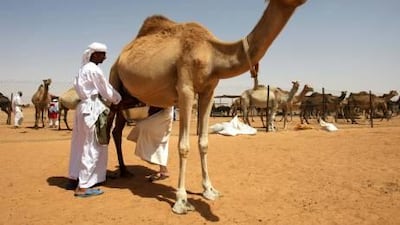DUBAI // A local company has proved the doubters wrong by producing the UAE's first commercial batch of camel milk cheese.
Researchers had claimed it would be impossible to make because camel milk does not coagulate as easily as cow or sheep milk - a vital step in cheesemaking.
But after three years of work, scientists at the Emirates Industry for Camel Milk and Products in Dubai, which sells its products under the Camelicious brand name, have solved the problem.
By April three types of camel milk cheese will be available in UAE supermarkets.
"It was difficult because the solid matter in the camel's milk is less than the cow's," said Mutasher Al Badry, the company's deputy general manager.
The milk contains less than 10 per cent solids, which makes it hard to get a yield of cheese that is commercially viable.
"In cow's milk, they have industrial and artificial items that we don't want to add because we want to reach a premium cheese," said Mr Al Badry.
The low yield means the cheese will be expensive - although prices have yet to be announced - and will be sold only in select supermarkets such as Spinneys, Union Co-op and Abu Dhabi Co-op.
About 1,000 litres a day of the farm's milk will be used to make the three types of cheese.
"We will produce a very low quantity in the first year because we don't have enough milk and we have a lot of demand for it," Mr Al Badry said.
One of the cheeses is ideal for salads, another for cooking and the third is a table cheese.
The packaging and branding for all three is still being finalised.
The "salad" cheese has a taste akin to feta, with a creamy texture, while the cooking cheese is similar to mozzarella, but with a softer interior.
The ingredients are healthy - camel milk has 40 per cent less fat and cholesterol than cow milk, three times more vitamin C, more minerals and iron.
"Camel milk has a lot of benefits," said Mr Al Badry. "It's very rich in vitamin C, calcium and has a lot of nutritional elements."
A Mauritanian company has produced a Brie-like cheese from camel milk for the past 20 years but it is sold only in Nouakchott, the nation's capital.
Camelicious said its cheese had received a royal seal of approval, having been taste-tested by chefs working for a UAE royal family.
"They were really happy with it, they decided which taste and which type to go for," Mr Al Badry said. "We have a vision to export all our products but first we need to fulfil local market needs with milk and cheese."
To that end, the farm is looking to buy more camels overseas, to increase its herd from 3,000 to about 6,000.
It is also seeking breeds that produce more milk - up to 12 litres a day, rather than the current six or seven.
For the time being, it is likely to export only camel milk powder, rather than fresh cheese, to avoid prohibitively high prices for international consumers.

